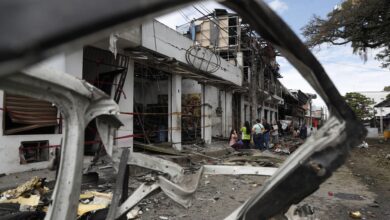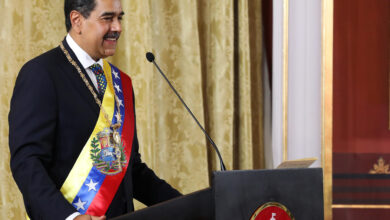The military coup in Gabon that has ousted President Ali Bongo from power is the second in a month to take place in Africa. We explain what is happening on this continent .

Photo: EFE/EPA/STR
EFE
Escucha este artículo
Leer en español: Golpe de Estado militar de Gabón: ¿Qué está pasando en África?
The military coup that has ousted President Ali Bongo from power in Gabon, the second in a month to take place in Africa. It is also added to numerous overthrows of this type on the continent since the beginning of the century.
This is the list of the main coups in Africa in the last two decades:

Central African Republic
On March 16, 2003, General François Bozizé proclaimed himself president after a coup in the absence of the country's then president, Ange-Félix Patassé. The latter already faced an attempt in May 2001, which resulted in at least seven deaths.
Guinea-Bissau
A military coup removed President Kumba Ialá from office on September 14, 2003. Henrique Rosa was named interim president. Ialá had suffered two previous attempts, in December 2001 and May 2002.
On April 12, 2012, another coup, shortly before the second round of the presidential elections, led to the arrest of the interim president, Raimundo Pereira, and former prime minister Carlos Gomes Júnior. The military justified their intervention by the existence of a secret agreement between Bissau and Angola that put the country's sovereignty at risk.
Mauritania
On August 3, 2005, President Muauia Ould Sidi Ahmed Talla was overthrown while abroad. Taya already suffered another failed military attempt in June 2003, which resulted in 15 deaths.
Again on August 6, 2008, a group of soldiers seized power and arrested the president, Sidi Mohamed Ould Sheikh Abdallahi, and the prime minister, Yahya Ould Ahmed. On August 14, the Military Junta appointed Mulay Uld Mohammed Prime Minister.
Madagascar
On March 17, 2009, the opposition leader Andry Rajoelina, supported by a coup sector of the Army, proclaimed himself president of the "Supreme Authority of the Transition." On March 17, 2010, there was a new military coup against the president, Marc Ravalomanana. The military Junta resigned from power and handed it over to the opposition leader, Andry Rajoelina.
Niger
On February 18, 2010, President Mamadou Tandja was deposed after a group of soldiers stormed the presidential palace. The coup colonel Salou Djibo was named head of state.
Another new coup took place on July 26, 2023 when Mohamed Bazoum was ousted and arrested by a coup military junta headed by Brigadier General Abdourahamane Tiani, who proclaimed himself president on the 28th of that month.
Mali
On March 22, 2012, President Amadou Toumane Touré, who was on a trip to Burkina Faso, was overthrown in a coup led by a group of soldiers who blamed him for his mismanagement of the crisis in northern Mali, the scene of an armed rebellion carried out by Tuareg separatists.
On August 18, 2020, a military group deposed President Ibrahim Boubacar Keita and created the National Council for the Salvation of the People (CNSP), the same body that on May 24, 2021 overthrew the transitional president, Bah Ndaw, and his Prime Minister Moctar Ouané.
Guinea-Conakry
On September 5, 2021, the military overthrew the President of Guinea-Conakry, Alpha Condé, in a coup.
Sudan
On October 25, 2021, the Sudanese military dissolved the government of the Prime Minister, Abdalá Hamdok, who through his collaborators rejected what he considered a coup d'état.
Burkina Faso
On January 23, 2022, a group of soldiers seized power and deposed President Roch Kaboré; again on September 30 of that year a second coup took place that removed the interim president, Paul Henri Sandaogo. Captain Ibrahim Traore assumed power on an interim basis.
Gabon
On August 30, 2023, a group of soldiers carried out a coup, the same day that the electoral commission announced the victory of the president, Ali Bongo, with 64.27% of the votes, in the presidential elections held last Saturday.




